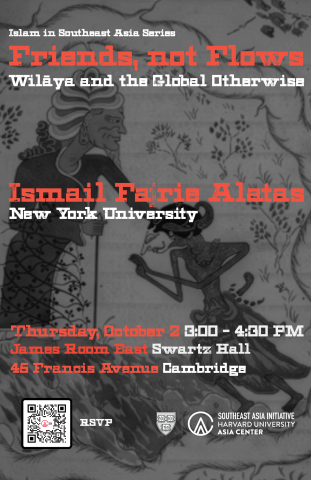Friends, not Flows: Wilāya and the Global Otherwise

Registration not required, but appreciated.
This talk explores a conception of global history beyond the familiar idioms of flows, networks, and connectivity. Taking as its guide the mid twentieth-century Arabic hagiographical compendium composed in Indonesia, The Crown of Brides (Tāj al-Aʿrās), I approach the text not as a static archive but as a site for excavating alternative world-making scheme. In it, Sufi scholars envisioned geography as a web of obligations that engenders an enduring circuit of grace (dāʾirat al-faḍl). At its heart lies the grammar of wilāya (protective friendship), which organizes relation through asymmetry, dependence, and generosity that exceed calculation, and in which hierarchy becomes hope, dependence becomes dignity, and continuity the very fabric of history. Reading the global through wilāya unsettles the social scientific privileging of connection, equivalence, and rupture, foregrounding instead the fragile surplus of care that binds trans-generational lives across the world.
Ismail Fajrie Alatas is associate professor of Middle Eastern and Islamic Studies, and History at New York University, and a fellow of The Royal Aal al-Bayt Institute for Islamic Thought, in the Hashemite Kingdom of Jordan. He is the author of What is Religious Authority? Cultivating Islamic Communities in Indonesia (Princeton, 2021) along with many articles, the latest of which – “Voicing God’s presence: Qurʾānic recitation, Sufi ontologies, and the theatro-graphic experience” – appeared in Hau: Journal of Ethnographic Theory (2024). He is currently working on a new book project that explores wilāya as a form of friendship and protection in Muslim societies.
Discussant: Teren Sevea, Harvard Divinity School
Please contact Jorge Espada at jorge_espada@harvard.edu with any questions.



